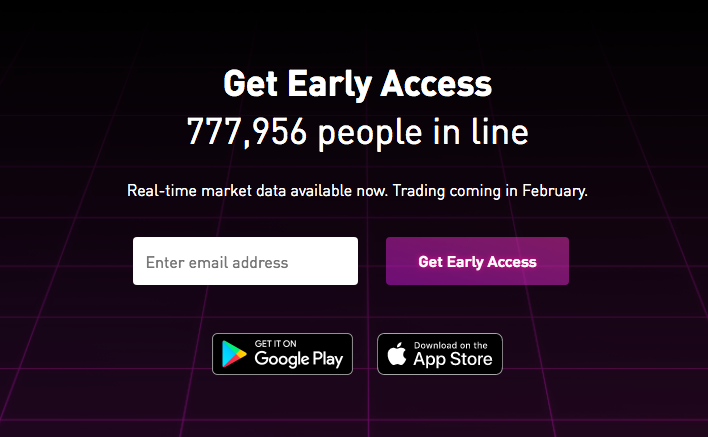
With almost 1 million users already signed up for early access to the upcoming launch of crypto exchange Robinhood, some of their proposed benefits seem a bit too good to be true.
The hype around Robinhood is blooming because they are positioning themselves in the market to take on Coinbase which has monopolised the on-boarding process of entering the crypto market.
At present, Coinbase is reported to be profiting $2.7million per day from the influx of investors into the bitcoin and crypto space who know no better than to pay the excessive deposit and trading fees charged by Coinbase.
Most crypto exchanges only allow deposits in the form of cryptocurrency. So in order to gain access to exchanges like Binance and Bittrex, investors must first find a entry point where they can exchange their fiat money for crypto and Coinbase provide the most user-friendly platform at present hence their market dominance.
The other area Robinhood are addressing is the mobile app platform which, to date, not a single cryptocurrency exchange has been able to address adequately by producing a good app product.
Various exchanges have attempted to do so but the ability to buy and sell crypto via a mobile app but none have been able to meet user expectations yet.
Could Robinhood change all that?
Trading Fees
The allure of Robinhood based on their advertising to date is the zero trade fees they will offer on Bitcoin and Ethereum trades.
The company’s press releases claim that they plan on operating the platform as a break-even business which has enabled them to offer the zero-commission trading.
Considering the size of the business and the fact there are almost 1 million people lining up to use their service, Robinhood will still need significant revenue to maintain many staff that keep the platform running from the developers to customer support and human resources.
Although they have highlighted the two most traded crytocurrencies (BTC and ETH), they have not addressed the fee structure on the other 14 cryptocurrencies they will offer trading pairs on.
If trading fees on altcoins is significantly higher than the market average (0.1% to 0.25%), it would significantly detract from the benefits of trading just BTC and ETH.
Withdrawal Fees
Reading reviews of various crypto exchanges, withdrawal fees is one of the most common complaints within forums.
Crypto exchanges have the right to set their own withdrawal fees on all cryptocurrency and fiat currencies that they hold but the fee is always higher than the actual cost to transaction validators (aka: miners).
Robinhood will attract mostly introductory crypto investors who will be looking for a taste of the crypto market without spending too much money. This will mean a lot of small-sized transactions ranging from $10 to $200.
For example, if an investor was looking to invest $50 in Bitcoin at the current price of $11,115, their $50 would net them 0.00449843 BTC.
Looking at major exchanges, the withdrawal fee for BTC on the following exchanges is:
Binance: 0.001 BTC ($11.16)
Bitfinex: 0.0008 BTC ($8.89)
Bittrex: 0.001 BTC ($11.16)
Considering Robinhood will need to make up for their zero-commission trade fees somewhere else, withdrawal fees look an easy target since most entry-level investors will not be aware of them when making their first trades.
That would mean a new investor who invested $50 in BTC would need to spend $11.16 to move it off Robinhood into a secured wallet with their own private key (actual ownership), at which point their investment has instantly depreciated 22.32%.
Investors will of course have the option to keep their investments on the Robinhood exchange but it is crucial that they understand the concept of private keys and Robinhood’s policies on hard forks and air drops.
Retail Arbitraging
Retail arbitraging is when a buyer is guaranteed to sell a product at a higher price than their total purchase expense– it is guaranteed profit.
If the exchange price on Robinhood is higher than the market average, they can significantly profit at the expense of their customer base by supplying liquidity into their markets.
For example, if BTC is trading at $12,000 on Robinhood but only $11,500 on Binance, Robinhood traders would add liquidity to their book and take it from Binance. Robinhood would then be pocketing $500 per unit of BTC traded which investors may not be concerned about due to the ease of on-boarding at Robinhood compared to other exchanges.
They key here is the fact that investors do not own the private keys to their purchases on Robinhood until they withdraw them which would require paying the platform’s yet-to-be-disclosed withdrawal fees.
In summary
Robinhood’s platform is a very exciting one if it can fix all of the problems Coinbase have encountered due to their enormous growth. Customer support will be critical to Robinhood’s immediate success because the crypto space is a very confusing one to those who fail to research sufficiently.
If Robinhood’s mobile app can be launched and trading can take place securely and in a timely manner, it will open them up to more seasoned crypto investors who are crying out for a trustworthy mobile trading app.
Congratulations @pennystox! You have completed some achievement on Steemit and have been rewarded with new badge(s) :
Click on any badge to view your own Board of Honor on SteemitBoard.
For more information about SteemitBoard, click here
If you no longer want to receive notifications, reply to this comment with the word
STOP